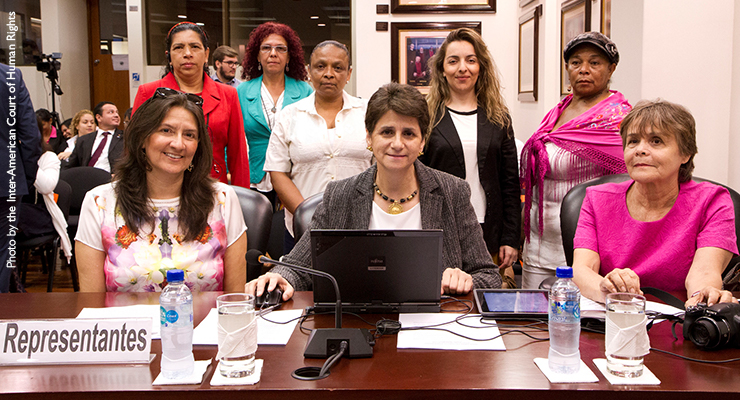
Colombia | Inter-American Court rules that the rights of women human rights defenders were violated
The Inter-American Court has found that Colombia failed to adopt adequate measures to protect the life of community leader Ana Teresa Yarce and guarantee the right to freedom of association, among others, of four women human rights defenders.
Este artículo también está disponible en Español.
On 10 January 2017, the Inter-American Court of Human Rights published the case Yarce and others vs. Colombia, concerning five women human rights defenders in Comuna 13, a neighbourhood in the city of Medellin. The women were part of two community organizations, Las Independencias Women’s Association (Asociación de Mujeres de las Independencias) and the Community Action Board (Juntas Comunales de Acción).
These women were subjected to threats and harassment. Two of the women’s homes were occupied and destroyed, which resulted in their displacement. Three of the women were arbitrarily arrested, and one was assassinated. Consequently, in fear for their lives, these women were forcibly displaced. These violations occurred in the context of the armed conflict – Comuna 13 is known for being the location where several military operations aimed at confronting armed groups took place. The armed confrontations lead to intra-urban displacement which exposed community leaders, particularly women human rights defenders, to heightened risks.
Findings of the Inter-American Court
The Court found that Colombia violated a number of the women rights, as well as their family members’, including: the right to life; personal integrity; personal liberty; rights of the family; judicial guarantees; property; freedom of association; and freedom of movement. The Court also declared the violation of Article 7 of the Inter-American Convention on the prevention, punishment and eradication of violence against women.
In finding that Colombia violated these rights, the Court concluded that:
- The State failed to prevent the assassination of community leader Ana Teresa Yarce by not implementing measures that corresponded to her situation as human rights defender, reiterating the standards laid out in its decision of Human Rights Defender vs Guatemala, which established that in situations concerning human rights defenders the State must:
a) ensure that special protection measures must keep with the functions performed by defenders;
b) assess the level of risk in order to adopt measures and monitor those that are in force; and
c) ensure it is possible to modify such measures in accordance with changes in the level of danger. - The State violated the women’s rights to freedom of association by failing to guarantee the necessary means for the defenders to freely carry out their activities, failing to guarantee the necessary conditions for the women to return to Comuna 13, and hindering their participation in the different social organizations, as a result of the killing of Mrs Yarce.
- The State violated the right to personal integrity, honour and dignity. The Court considered that the arbitrary detention and criminal proceedings against three of the women resulted in them being stigmatised and exposed them to threats and humiliation; the women were identified as ‘guerrilleras’, which affected their work as defenders.
Finally, the Court ordered the State to adopt adequate reparation measures to the victims and their families and to implement a program in Comuna 13 to promote the work of human rights defenders and encourage dialogue between the community, defenders and the State.
Fabiana Pardi, a fellow at the International Service for Human Rights, welcomed the important decision from the Inter-American System which builds on its recent order for States to adopt effective public policies for defender protection.
‘It is integral that the Court continue its work to address specific risks and protection needs of women human rights defenders as articulated in the American Convention, especially in the current circumstances where they are exposed to serious risks,’ said Ms Pardi.
This ruling is only available in Spanish.
